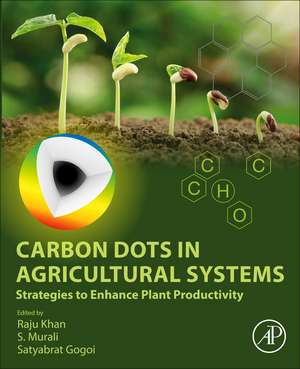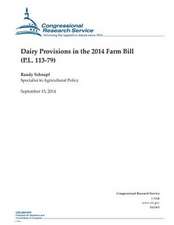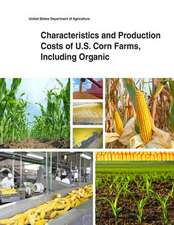Carbon Dots in Agricultural Systems: Strategies to Enhance Plant Productivity
Editat de Raju Khan, S. Murali, Satyabrat Gogoien Limba Engleză Paperback – 26 mai 2022
Finally, the book highlights emerging innovative topics which are of great relevance to scientists, academicians and innovators in agriculture (soil science, agricultural chemistry and agronomy) and biotechnology for further research and development.
- Encompasses the cost-effective novel synthesis of CDs from biomass materials, with a special emphasis on locally available agro-residues
- Comprises nanotechnology-based approaches for applications in agricultural plant systems
- Addresses the mechanism of carbon dots as activators of photosynthesis through their photoluminescent properties
- Presents the output mechanism of carbon dots applications in agriculture with relevance to biomass and main crop yield
Preț: 671.54 lei
Preț vechi: 878.38 lei
-24% Nou
128.54€ • 139.67$ • 108.04£
Carte tipărită la comandă
Livrare economică 14-28 aprilie
Specificații
ISBN-10: 032390260X
Pagini: 310
Ilustrații: 96 illustrations (60 in full color)
Dimensiuni: 191 x 235 x 23 mm
Greutate: 0.54 kg
Editura: ELSEVIER SCIENCE
Cuprins
1. Introduction
2. Current Trends in Carbon dots Applications
3. Overview of Carbon Dot Synthesis
4. Synthesis of Carbon dots from Biomass Resources
5. Physical and Chemical Properties of Carbon Dots
6. Characterization of Carbon Dots for Optical Properties
7. Effect and Mechanism of Carbon dots in Photosynthesis and Plant system
8. Application of Carbon dots in Agriculture system
9. Comparative Studies on Carbon dots Application in Plant system
10. Role of Carbon Dots in Agriculture System: Biotechnology and Nanotechnology Approach
11. Post-harvest Applications of Carbon dots in Agriculture: Food Safety
12. Conclusions and Future Prospects
Descriere
Carbon Dots in Agricultural Systems integrates and crystallizes the emerging knowledge and application strategies of carbon dots as a powerful tool in agriculture systems. The book includes practical insights into the synthesis of carbon dots from indigenous raw materials and how to employ them in agriculture systems to increase crop productivity and provide renewable and cost-effective strategies that meet agricultural needs. Presented by an international team of experts, this resource updates on the latest in synthesis, physical, chemical and optical properties, along with the effects and mechanisms of carbon dots, all further explained in real-world studies.
Finally, the book highlights emerging innovative topics which are of great relevance to scientists, academicians and innovators in agriculture (soil science, agricultural chemistry and agronomy) and biotechnology for further research and development.
- Encompasses the cost-effective novel synthesis of CDs from biomass materials, with a special emphasis on locally available agro-residues
- Comprises nanotechnology-based approaches for applications in agricultural plant systems
- Addresses the mechanism of carbon dots as activators of photosynthesis through their photoluminescent properties
- Presents the output mechanism of carbon dots applications in agriculture with relevance to biomass and main crop yield



















